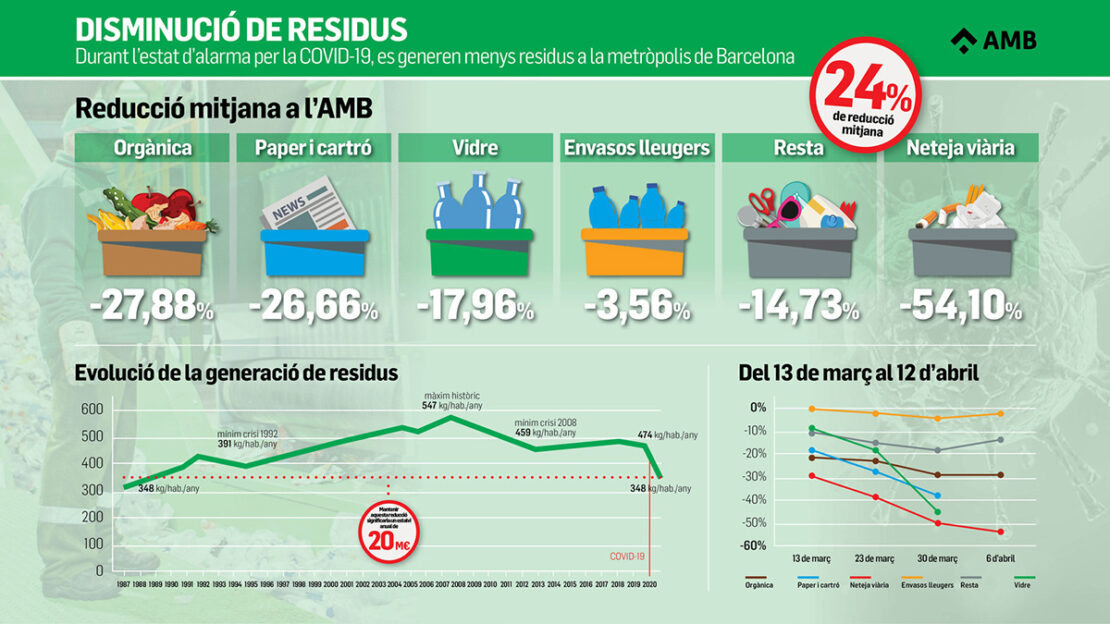
After the first month of the health crisis caused by Covid19 and trying to manage as a society the emotional shaking and human pain that this pandemic is causing, we begin to have quantitative evidence of its impact on waste generation.
According to production and selective collection data published by the Barcelona Metropolitan Area, the Catalan Waste Agency, and the Balearic Government, municipal waste has suffered a clear decrease.
In Catalonia the decrease has been of 17% on average. The most important drop in the metropolitan area – where a large number of services and other economic activities are concentrated – was observed in the city of Barcelona with 25%, reaching waste generation levels of the late 80s.
In the Balearic Islands the decrease has been slightly less, standing at 14%. Island-wise, the reduction has been more pronounced in the Pitiusas, placing Ibiza at the forefront with a 22% drop and 18% in Formentera. The reduction in Mallorca has been of 14% and Menorca is the island with less decrease with only 6%.
Regarding selective collection (organic, paper/cardboard, glass and light packaging) the data also indicates a clear decrease. In Catalunya it fell 20% in relation to a regular month. Despite the fact that all the fractions suffer significant falls, those linked to the non-food commercial sector – paper and cardboard – and restaurants (organic and glass) stand out. Light packaging also shows a reduction although less intense and the increase in disposable soft drink and beer containers is notable since they cannot be consumed in bars where returnable containers are still used.
In the Balearic Islands, the drop in selective collection is less, standing at an average of 11%. A similar dynamic is observed by fractions, being that of paper and cardboard the one with the greatest decrease (19%) followed by the bio-waste fraction (12%) and glass containers (11%). On the other hand, a slight increase of 2% is detected in the case of light packaging. The mixed ordinary waste generation decreased by 15%.
The impact of Covid19 is also observed at the level of street cleaning due to both the decrease of waste in the bins (with limited citizen mobility and lack of tourists, as is the case, for example, in the cities of Palma in the Balearic Islands or Barcelona in Catalunya). Bulky waste has also dropped significantly due to the stop of municipal collection services.
This data shows the importance of certain economic sectors in the generation of municipal waste, as well as the efficiency of certain collection models.
On the one hand, the impact of the restaurant sector on the decrease in the generation of organic fraction makes us aware of the importance of selective collection in this sector and of the need to generalize this segregated collection in all municipalities, together with the rest of commercial waste, with systems such as door-to-door that also guarantee its highest quality.
Likewise, the impact on the generation of packaging waste (paper/cardboard, glass and light packaging) provides us with significant data on the current distribution model and on the breach of the citizens’ right to consume without generating waste. Without the chance to consume in restaurants, where returnable beers and soft drinks containers are still used, citizens continue with their beverage and food consumption patterns during lockdown, but they do so with the packaging found in commercial establishments, that is, in smaller formats and in disposable containers.
It will also be necessary to see what the fluctuations in market shares have been for commercial establishments (large distribution compared to local business) and how it affects the feeling of vulnerability and fear of contagion regarding consumer purchases in bulk and with reusable items which some establishments have stopped allowing during the health crisis.
It is obvious that it is still too early to analyse what the long-term consequences of the pandemic are, both in the citizens’ separation and selective collection and food-product consumption habit. In-depth analysis will be necessary, based on all the factors and agents involved in the consumption and distribution model. Specially to take those measures that mitigate a possible rebound in the generation of waste (increasing even previous production levels) and to protect the right of consumers to consume without generating waste or impacting our health.
We will miss a great opportunity if, through shared responsibility, we are not now able to promote decarbonization and dematerialization policies that support those initiatives and activities that accelerate the transition to zero waste. A production and consumption model where products are designed with eco-design, minimization of waste, repairability, reuse and – at the end of their useful life – recovery and recycling criteria. If we are not able to do so, we will contribute to a further weakened society with less possibility of tackling the climate, materials, energy crisis that we are already experiencing, or the next health crisis.
More information rezero.cat